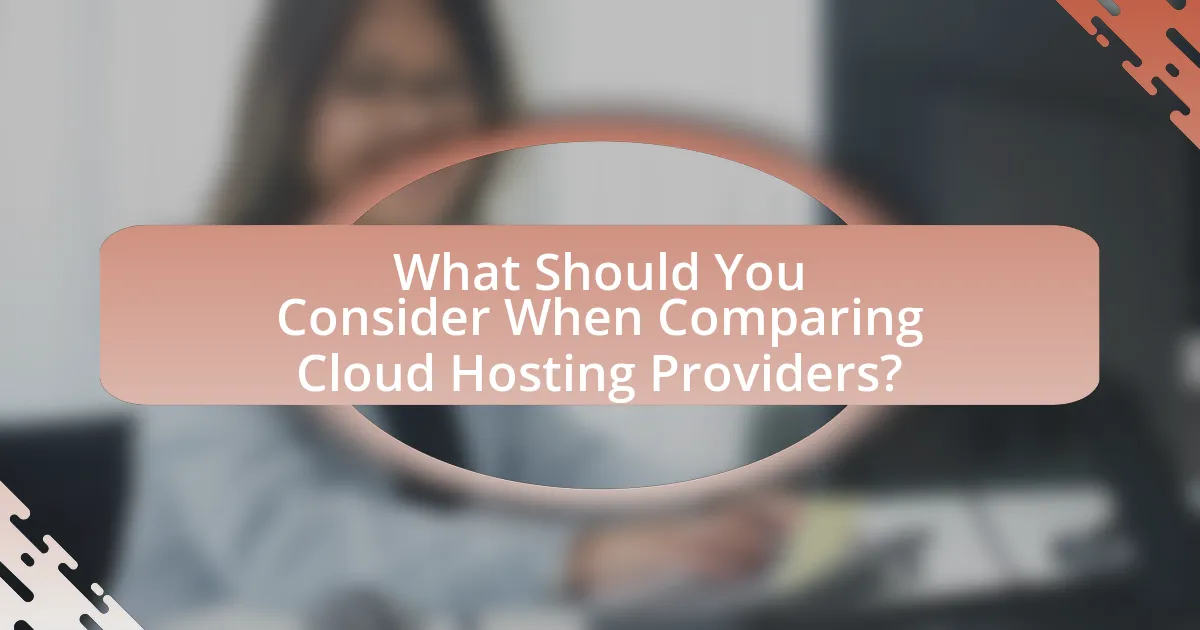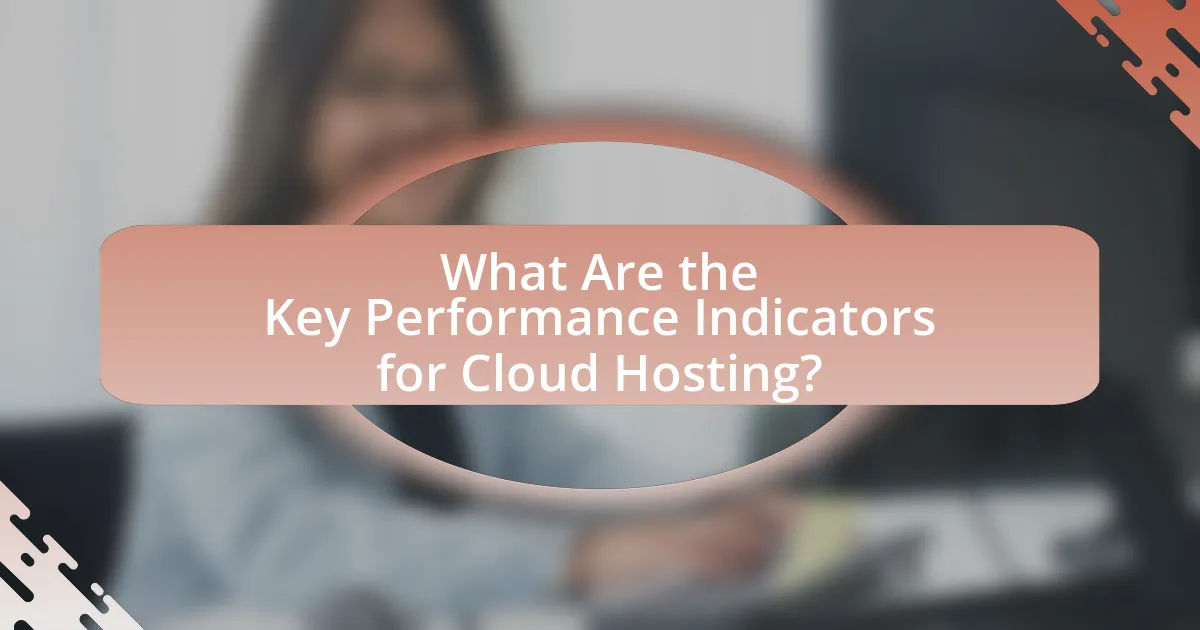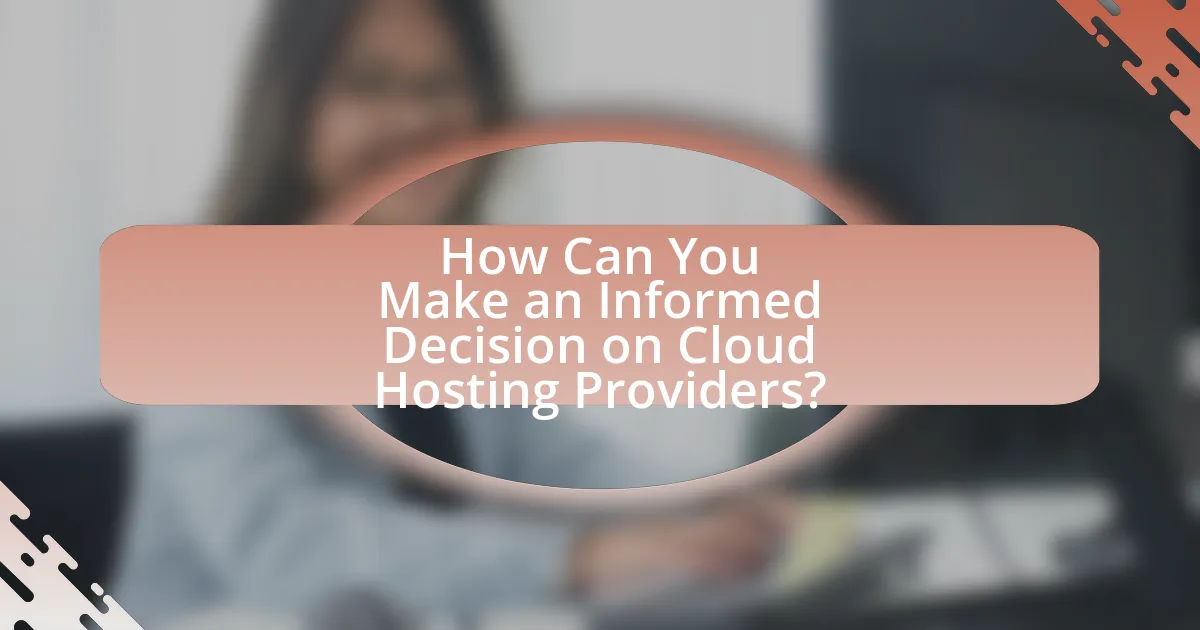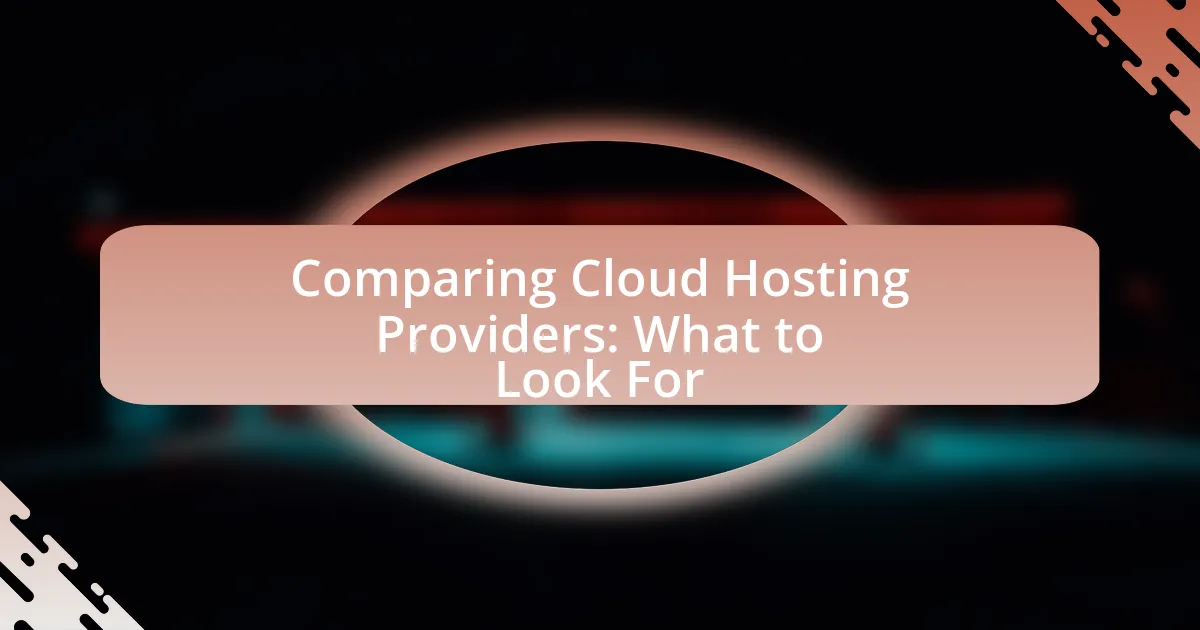The article focuses on comparing cloud hosting providers, emphasizing critical factors such as performance, scalability, security, pricing, and customer support. It outlines the impact of different cloud hosting models, including IaaS, PaaS, and SaaS, on decision-making, as well as the significance of deployment models like public, private, and hybrid clouds. Key features to consider when selecting a provider are discussed, including uptime guarantees, security compliance, and responsive customer support. Additionally, the article highlights best practices for evaluating providers, common pitfalls to avoid, and the importance of understanding pricing structures and total cost of ownership.

What Should You Consider When Comparing Cloud Hosting Providers?
When comparing cloud hosting providers, you should consider factors such as performance, scalability, security, pricing, and customer support. Performance is crucial as it affects the speed and reliability of your applications; for instance, providers with high uptime guarantees (99.9% or higher) are preferable. Scalability allows your resources to grow with your business needs, ensuring you can handle increased traffic without service interruptions. Security features, including data encryption and compliance with regulations like GDPR, are essential to protect sensitive information. Pricing models should be transparent and align with your budget, taking into account any hidden fees. Lastly, responsive customer support can significantly impact your experience, so look for providers with 24/7 support and positive reviews regarding their service.
How do different cloud hosting models impact your choice?
Different cloud hosting models significantly impact your choice by influencing factors such as cost, scalability, control, and management. For instance, public cloud models offer lower costs and high scalability, making them suitable for businesses with variable workloads, while private clouds provide enhanced security and control, appealing to organizations with strict compliance requirements. Hybrid clouds combine both models, allowing flexibility and optimization of resources based on specific needs. According to a report by Gartner, 81% of enterprises have adopted a multi-cloud strategy, highlighting the importance of selecting the right model to align with business objectives and operational demands.
What are the key differences between IaaS, PaaS, and SaaS?
IaaS (Infrastructure as a Service), PaaS (Platform as a Service), and SaaS (Software as a Service) differ primarily in the level of control and management they provide to users. IaaS offers virtualized computing resources over the internet, allowing users to manage operating systems, storage, and applications while the provider manages the underlying infrastructure. PaaS provides a platform allowing developers to build, deploy, and manage applications without dealing with the complexities of the underlying hardware and software layers, as the provider manages the infrastructure and platform software. SaaS delivers software applications over the internet on a subscription basis, where users access the software without managing the underlying infrastructure or platform, as the provider handles everything from servers to application updates.
These distinctions highlight the varying degrees of control and management responsibilities between the three service models, with IaaS offering the most control, followed by PaaS, and SaaS providing the least.
How does the deployment model (public, private, hybrid) affect your decision?
The deployment model significantly influences decision-making by determining factors such as cost, security, and scalability. Public cloud models offer lower costs and high scalability, making them suitable for businesses with fluctuating workloads. Private clouds provide enhanced security and control, ideal for organizations handling sensitive data. Hybrid models combine both, allowing flexibility and optimized resource allocation. According to a report by Gartner, 70% of enterprises are expected to adopt hybrid cloud environments by 2025, highlighting the growing preference for models that balance cost-effectiveness with security needs.
What are the essential features to look for in cloud hosting providers?
The essential features to look for in cloud hosting providers include scalability, reliability, security, performance, and customer support. Scalability allows businesses to adjust resources based on demand, ensuring they only pay for what they use. Reliability is crucial, as it indicates the provider’s uptime and availability; a good benchmark is 99.9% uptime. Security features, such as data encryption and compliance with standards like GDPR, protect sensitive information. Performance metrics, including load times and server response rates, impact user experience. Lastly, responsive customer support ensures that issues are resolved quickly, which is vital for maintaining business operations.
How important is scalability in cloud hosting?
Scalability is crucial in cloud hosting as it allows businesses to adjust resources based on demand. This flexibility ensures that companies can efficiently manage varying workloads without incurring unnecessary costs. According to a report by Gartner, organizations that leverage scalable cloud solutions can reduce operational costs by up to 30% while improving performance and responsiveness. Thus, the ability to scale resources up or down is a fundamental aspect of effective cloud hosting, directly impacting operational efficiency and cost-effectiveness.
What role does security play in selecting a cloud hosting provider?
Security is a critical factor in selecting a cloud hosting provider, as it directly impacts data protection and compliance with regulations. A reliable cloud hosting provider implements robust security measures, including encryption, access controls, and regular security audits, to safeguard sensitive information. For instance, according to a report by the Cloud Security Alliance, 94% of organizations experienced a security incident in the cloud, highlighting the necessity for strong security protocols. Additionally, compliance with standards such as GDPR and HIPAA is essential, as failure to meet these requirements can result in significant legal and financial repercussions. Therefore, evaluating a provider’s security features and compliance certifications is essential for ensuring the safety of data in the cloud.
How do pricing structures vary among cloud hosting providers?
Pricing structures among cloud hosting providers vary significantly based on factors such as resource allocation, billing models, and service tiers. For instance, some providers like Amazon Web Services (AWS) utilize a pay-as-you-go model, charging users based on actual resource consumption, while others, such as DigitalOcean, offer fixed pricing plans that include a set amount of resources for a monthly fee. Additionally, providers may implement tiered pricing, where costs decrease as usage increases, or offer discounts for long-term commitments. This variability allows businesses to choose a pricing structure that aligns with their specific needs and budget constraints.
What are the common pricing models used by cloud hosting providers?
Common pricing models used by cloud hosting providers include pay-as-you-go, reserved instances, and spot pricing. Pay-as-you-go allows users to pay only for the resources they consume, making it flexible for varying workloads. Reserved instances require users to commit to a specific amount of resources for a set period, often resulting in cost savings compared to pay-as-you-go rates. Spot pricing enables users to bid on unused cloud capacity, which can lead to significant discounts but comes with the risk of service interruption. These models cater to different user needs and budget constraints, providing options for both predictable and variable workloads.
How can you estimate the total cost of ownership for cloud hosting?
To estimate the total cost of ownership for cloud hosting, calculate all direct and indirect costs associated with the cloud services over a specific period. This includes subscription fees, data transfer costs, storage expenses, and any additional charges for services like backups or security. According to a report by Gartner, organizations often overlook hidden costs such as management overhead and potential downtime, which can significantly impact the total cost. By analyzing these factors comprehensively, businesses can achieve a more accurate estimation of their cloud hosting expenses.

What Are the Key Performance Indicators for Cloud Hosting?
Key Performance Indicators (KPIs) for cloud hosting include uptime, response time, scalability, and cost efficiency. Uptime measures the percentage of time the service is operational, with industry standards typically aiming for 99.9% or higher. Response time indicates how quickly the cloud service responds to requests, which is crucial for user experience; optimal response times are generally under 200 milliseconds. Scalability assesses the ability to adjust resources based on demand, ensuring that performance remains consistent during traffic spikes. Cost efficiency evaluates the pricing structure relative to the performance and resources provided, allowing businesses to maximize their investment. These KPIs are essential for comparing cloud hosting providers effectively.
How do uptime and reliability affect your cloud hosting choice?
Uptime and reliability are critical factors in selecting a cloud hosting provider, as they directly impact the availability and performance of hosted applications. High uptime percentages, typically above 99.9%, ensure that services remain accessible to users, minimizing downtime and potential revenue loss. For instance, a study by Gartner indicates that even a minute of downtime can cost businesses thousands of dollars, emphasizing the importance of reliable hosting. Therefore, when comparing cloud hosting options, prioritizing providers with proven uptime records and robust reliability guarantees is essential for maintaining operational continuity and customer satisfaction.
What is the industry standard for uptime guarantees?
The industry standard for uptime guarantees is typically 99.9%, often referred to as “three nines.” This standard indicates that a service is expected to be operational and accessible 99.9% of the time over a given period, which translates to approximately 8.76 hours of downtime annually. Many cloud hosting providers adhere to this benchmark to ensure reliability and customer satisfaction, as it is widely recognized in the industry.
How can you assess the reliability of a cloud hosting provider?
To assess the reliability of a cloud hosting provider, evaluate their uptime guarantees, customer reviews, and service level agreements (SLAs). Uptime guarantees typically indicate the percentage of time the service is operational; for instance, a provider offering 99.9% uptime is expected to be down for no more than 8.76 hours annually. Customer reviews provide insights into real-world experiences, highlighting issues such as downtime, support responsiveness, and overall satisfaction. Additionally, SLAs outline the provider’s commitments regarding service performance, including response times for support and compensation for downtime, which can further validate their reliability.
What impact does customer support have on cloud hosting services?
Customer support significantly impacts cloud hosting services by influencing customer satisfaction and retention. Effective customer support ensures that users can quickly resolve technical issues, which is crucial in a cloud environment where downtime can lead to substantial financial losses. According to a study by Zendesk, 82% of consumers have stopped doing business with a company due to poor customer service, highlighting the importance of responsive and knowledgeable support teams in maintaining client relationships. Furthermore, cloud hosting providers with robust customer support often receive higher ratings and recommendations, which can directly affect their market competitiveness and growth.
What types of customer support options should you expect?
You should expect several types of customer support options when evaluating cloud hosting providers, including live chat, email support, phone support, and knowledge bases. Live chat offers real-time assistance, while email support allows for detailed inquiries and responses. Phone support provides direct communication for urgent issues, and knowledge bases serve as self-service resources for common questions. According to a survey by Zendesk, 67% of consumers have used a company’s website to find answers to their questions, highlighting the importance of accessible support options.
How can response times influence your experience with cloud hosting?
Response times significantly influence your experience with cloud hosting by directly affecting the speed and efficiency of application performance. Faster response times lead to quicker data retrieval and processing, enhancing user satisfaction and productivity. For instance, a study by Google found that a one-second delay in page load time can reduce conversions by 20%. Therefore, selecting a cloud hosting provider with low latency and high-speed response times is crucial for optimal performance and user engagement.
What are the implications of data location and compliance?
Data location and compliance significantly impact data governance, legal liability, and operational efficiency. Organizations must adhere to local laws and regulations, such as the General Data Protection Regulation (GDPR) in Europe, which mandates that personal data of EU citizens be stored and processed within the EU. Non-compliance can result in substantial fines, with GDPR penalties reaching up to 4% of annual global turnover or €20 million, whichever is higher. Additionally, data location affects latency and performance; data stored closer to users can enhance access speed and service reliability. Therefore, understanding the implications of data location and compliance is crucial for organizations to mitigate risks and optimize their cloud hosting strategies.
How does data residency affect your cloud hosting decision?
Data residency significantly influences cloud hosting decisions by determining where data is stored and processed, which impacts compliance with local laws and regulations. Organizations must consider data residency to ensure adherence to regulations such as the General Data Protection Regulation (GDPR) in Europe, which mandates that personal data of EU citizens be stored within the EU. Non-compliance can lead to substantial fines, with GDPR penalties reaching up to 4% of annual global turnover. Additionally, data residency affects latency and performance; hosting data closer to users can enhance access speeds and improve user experience. Therefore, understanding data residency requirements is crucial for selecting a cloud provider that aligns with legal obligations and operational needs.
What compliance standards should your cloud provider meet?
A cloud provider should meet compliance standards such as ISO 27001, GDPR, HIPAA, and SOC 2. ISO 27001 ensures an information security management system is in place, while GDPR governs data protection and privacy for individuals within the European Union. HIPAA is crucial for healthcare-related data, ensuring the protection of sensitive patient information. SOC 2 focuses on the management of customer data based on five trust service principles: security, availability, processing integrity, confidentiality, and privacy. Meeting these standards demonstrates a cloud provider’s commitment to security and regulatory compliance, which is essential for businesses handling sensitive information.

How Can You Make an Informed Decision on Cloud Hosting Providers?
To make an informed decision on cloud hosting providers, evaluate key factors such as performance, security, scalability, and customer support. Performance can be assessed through uptime guarantees and speed benchmarks, with reputable providers typically offering at least 99.9% uptime. Security features should include data encryption, compliance with standards like GDPR, and regular security audits. Scalability is crucial for accommodating growth, so choose providers that offer flexible resource allocation. Customer support should be responsive and available 24/7, as indicated by user reviews and service level agreements. By analyzing these factors, you can select a cloud hosting provider that aligns with your specific needs and requirements.
What are the best practices for evaluating cloud hosting providers?
The best practices for evaluating cloud hosting providers include assessing performance, security, scalability, support, and pricing. Evaluating performance involves checking uptime guarantees and speed metrics, as reliable providers typically offer at least 99.9% uptime. Security should be scrutinized by reviewing compliance certifications such as ISO 27001 and GDPR adherence, as these indicate robust data protection measures. Scalability is crucial; providers should offer flexible plans that can grow with your business needs, often demonstrated through customer case studies. Support quality can be evaluated by examining response times and availability of 24/7 assistance, which reputable providers usually highlight in their service level agreements. Finally, pricing should be transparent, with a clear breakdown of costs to avoid hidden fees, as established providers often provide detailed pricing models to ensure customer understanding.
How can you leverage customer reviews and case studies in your evaluation?
You can leverage customer reviews and case studies in your evaluation by analyzing the feedback to identify strengths and weaknesses of cloud hosting providers. Customer reviews provide real-world insights into performance, reliability, and customer service, while case studies illustrate successful implementations and outcomes. For instance, a study by BrightLocal found that 91% of consumers read online reviews, indicating their significant influence on decision-making. By systematically reviewing this feedback, you can make informed comparisons between providers based on actual user experiences and documented success stories.
What tools can assist you in comparing cloud hosting options?
Several tools can assist in comparing cloud hosting options, including cloud comparison websites, benchmarking tools, and cost calculators. Websites like CloudHarmony and G2 provide side-by-side comparisons of cloud providers based on performance metrics, user reviews, and pricing. Benchmarking tools such as Apache JMeter and Loader.io allow users to test the performance of different cloud services under various loads. Cost calculators from providers like AWS and Azure help estimate expenses based on usage patterns, enabling informed financial decisions. These tools collectively facilitate a comprehensive evaluation of cloud hosting options, ensuring users select the most suitable provider for their needs.
What common pitfalls should you avoid when selecting a cloud hosting provider?
When selecting a cloud hosting provider, avoid common pitfalls such as underestimating your needs, overlooking security features, and ignoring scalability options. Underestimating your needs can lead to inadequate resources, resulting in performance issues; for instance, a study by Gartner indicates that 70% of organizations experience performance degradation due to insufficient cloud resources. Overlooking security features can expose your data to breaches, as 43% of cyberattacks target small businesses, according to the Verizon Data Breach Investigations Report. Ignoring scalability options may hinder your ability to grow, as 60% of businesses report that their cloud solutions failed to scale with their needs.
How can vendor lock-in affect your long-term strategy?
Vendor lock-in can significantly hinder long-term strategy by limiting flexibility and increasing costs. When a business becomes dependent on a specific vendor’s technology or services, it faces challenges in switching providers or integrating new solutions, which can stifle innovation and adaptability. For instance, a study by Gartner indicates that organizations can incur costs up to 30% more when switching cloud providers due to data transfer fees and the need for new training. This dependency can also lead to reduced bargaining power, as the vendor may impose unfavorable terms or pricing, further impacting the organization’s strategic planning and financial health.
What are the risks of choosing a provider based solely on price?
Choosing a provider based solely on price can lead to several significant risks, including compromised service quality, inadequate support, and hidden costs. Providers that offer lower prices may cut corners on infrastructure, resulting in slower performance and increased downtime, which can negatively impact business operations. Additionally, budget providers often lack robust customer support, leaving clients without assistance during critical issues. Furthermore, low initial pricing may not reflect the total cost of ownership, as hidden fees for essential services can accumulate over time, leading to unexpected expenses. These factors highlight the importance of evaluating providers based on a comprehensive assessment of value rather than price alone.
What final tips can help you choose the right cloud hosting provider?
To choose the right cloud hosting provider, prioritize evaluating performance, security, scalability, and customer support. Performance is critical; select a provider with a proven track record of uptime and speed, as downtime can lead to significant revenue loss. Security features, such as data encryption and compliance with standards like GDPR, are essential to protect sensitive information. Scalability ensures that the hosting solution can grow with your business needs, allowing for easy resource adjustments. Lastly, reliable customer support, available 24/7, is vital for resolving issues promptly. According to a 2021 survey by HostingAdvice, 70% of users reported that responsive customer support was a key factor in their satisfaction with a cloud hosting provider.


